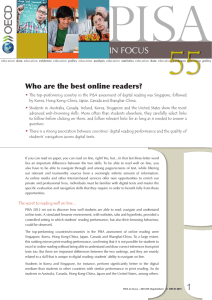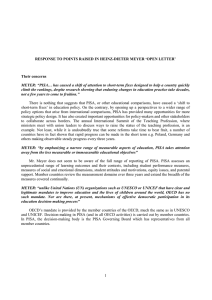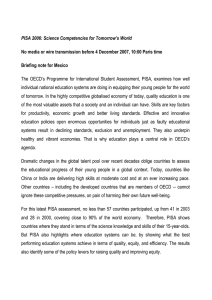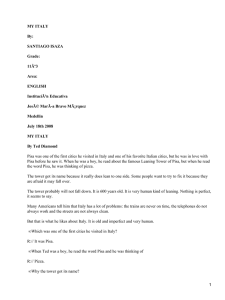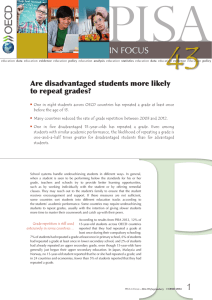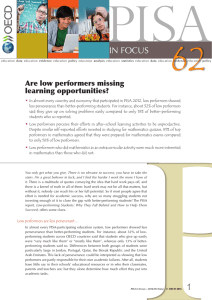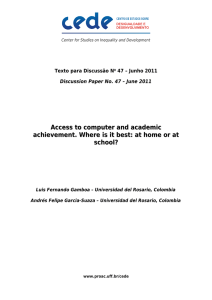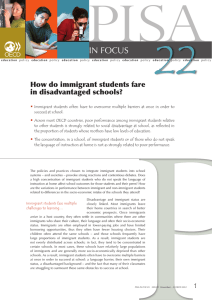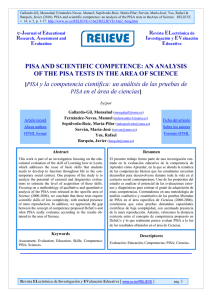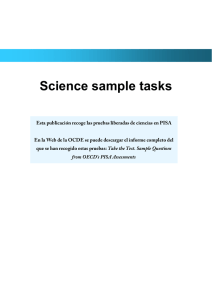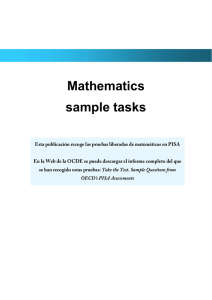Has discipline in school deteriorated?
Anuncio
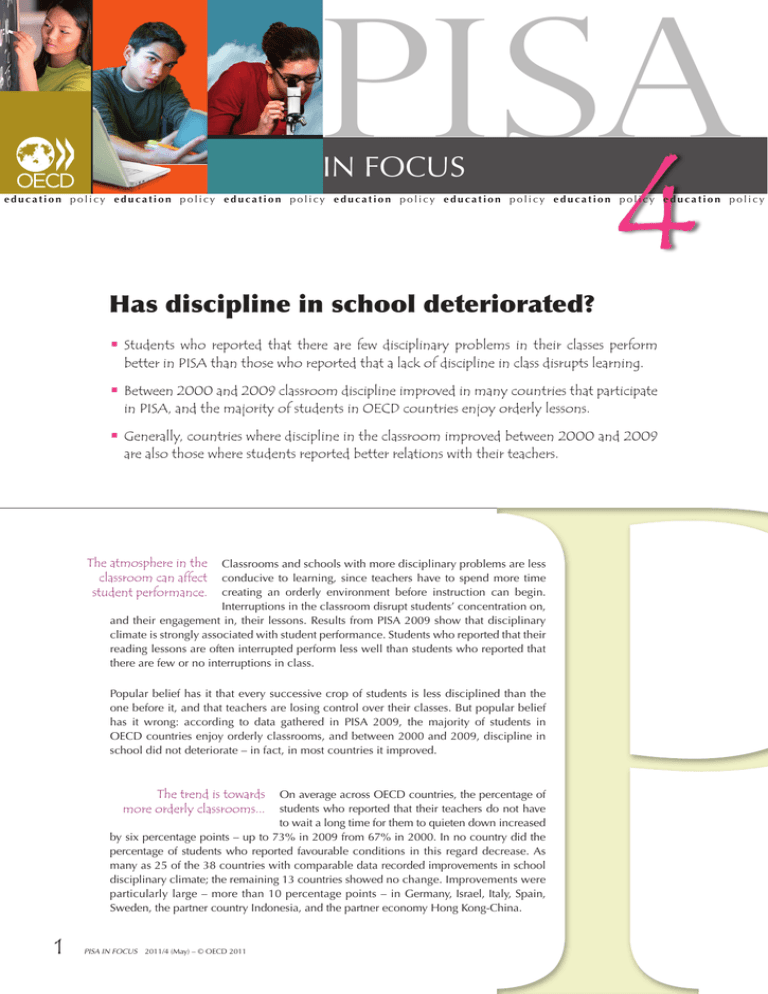
PISA in Focus 4 education policy education policy education policy education policy education policy education policy education policy Has discipline in school deteriorated? •Students who reported that there are few disciplinary problems in their classes perform better in PISA than those who reported that a lack of discipline in class disrupts learning. •Between 2000 and 2009 classroom discipline improved in many countries that participate in PISA, and the majority of students in OECD countries enjoy orderly lessons. •Generally, countries where discipline in the classroom improved between 2000 and 2009 are also those where students reported better relations with their teachers. The atmosphere in the classroom can affect student performance. Classrooms and schools with more disciplinary problems are less conducive to learning, since teachers have to spend more time creating an orderly environment before instruction can begin. Interruptions in the classroom disrupt students’ concentration on, and their engagement in, their lessons. Results from PISA 2009 show that disciplinary climate is strongly associated with student performance. Students who reported that their reading lessons are often interrupted perform less well than students who reported that there are few or no interruptions in class. Popular belief has it that every successive crop of students is less disciplined than the one before it, and that teachers are losing control over their classes. But popular belief has it wrong: according to data gathered in PISA 2009, the majority of students in OECD countries enjoy orderly classrooms, and between 2000 and 2009, discipline in school did not deteriorate – in fact, in most countries it improved. The trend is towards more orderly classrooms... On average across OECD countries, the percentage of students who reported that their teachers do not have to wait a long time for them to quieten down increased by six percentage points – up to 73% in 2009 from 67% in 2000. In no country did the percentage of students who reported favourable conditions in this regard decrease. As many as 25 of the 38 countries with comparable data recorded improvements in school disciplinary climate; the remaining 13 countries showed no change. Improvements were particularly large – more than 10 percentage points – in Germany, Israel, Italy, Spain, Sweden, the partner country Indonesia, and the partner economy Hong Kong-China. 1 PISA IN FOCUS 2011/4 (May) – © OECD 2011 PISA in Focus Students report calm classrooms Percentage of students who reported that the teacher “never or hardly ever” or “in some lessons” has to wait a long time for students to quieten down % of students in PISA 2009 Japan Kazakhstan Shanghai-China Hong Kong-China Romania Korea Azerbaijan Thailand Albania Russian Federation Peru Macao-China Kyrgyzstan Lithuania Colombia Montenegro Chinese Taipei Portugal Indonesia Latvia Mexico United States Denmark Germany Singapore Liechtenstein Panama Turkey Switzerland Jordan Serbia United Kingdom Poland Bulgaria Estonia Iceland Dubai (UAE) Israel Spain Slovak Republic Canada OECD average Austria Sweden Australia Ireland Italy Croatia Hungary Uruguay New Zealand Belgium Czech Republic Slovenia Brazil Trinidad and Tobago Qatar Tunisia Norway Chile Luxembourg France Netherlands Finland Greece Argentina Over the period, there was a decline of two percentage points in the share of students in OECD countries who reported that students cannot work well during their reading classes. However, some of the countries with the worst records in this respect showed large improvements. In 2000, 69% of students in Israel and 74% of students in Hungary disagreed with the statement that students can “never” or “almost never” work well during their reading classes; by 2009, this proportion had increased to 77% in Israel and 80% in Hungary. 93 91 90 89 89 88 88 86 86 85 85 84 84 84 81 80 80 80 79 79 79 79 78 78 77 76 75 74 74 74 74 74 74 73 73 73 73 73 73 73 72 72 71 71 71 70 70 69 69 69 68 68 68 68 67 66 66 66 66 65 64 64 63 63 62 62 Between 2000 and 2009 there was no change in the share of students in OECD countries who reported that there was noise and disorder during their reading classes. However, some of the countries with the worst records in this respect – where only one in two students reported that noise and disorder “never” or “almost never” occurred in class – showed large improvements. In 2000, between 51% and 54% of students in Chile, Greece and Italy reported that there was “never” or “almost never” noise and disorder during their lessons; by 2009, this proportion had increased to 63% in Chile, 58% in Greece and 68% in Italy, an indication that lesson times had become more peaceful. 50 60 70 80 90 100 % Countries are ranked in descending order of the percentage of students who reported that the teacher “never or hardly ever” or “in some lessons” has to wait a long time for students to quieten down. Source: OECD, PISA 2009 Database, Figure IV.4.2. 2 PISA IN FOCUS 2011/4 (May) – © OECD 2011 PISA in Focus …and better student-teacher relations Positive student-teacher relations are crucial for establishing a classroom environment that is conducive to learning. Research finds that students learn more and have fewer disciplinary problems when they feel that their teachers take them seriously. In 2000, PISA results suggested that the majority of students were generally satisfied with the quality of their relations with their teachers. By 2009, the quality of student-teacher relations was even better. Improvement in class discipline between 2000 and 2009 Change in the percentage of students who reported that the teacher “never or hardly ever” or “in some lessons” has to wait a long time for students to quieten down Change in percentage between 2000 and 2009 35 30 25 20 15 10 5 67 68 93 Belgium Japan 85 Brazil 80 Portugal Russian Federation 62 88 65 Chile Korea 78 Denmark Greece 73 86 Thailand 79 United States OECD average-26 72 73 Norway Iceland 73 66 Bulgaria 85 79 Mexico Peru 89 Romania Canada 73 89 73 Spain Hong Kong-China 78 Germany Israel 70 71 Sweden 79 Italy Indonesia 0 Percentage of students in PISA 2009 Note: Only those countries (25 out of 38) with a significant improvement in class discipline are shown. Countries are ranked in descending order of the change in the percentage of students who reported that the teacher “never or hardly ever” or “in some lessons” has to wait a long time for students to quieten down. Source: OECD, PISA 2009 Database, Table V.5.12. Between 2000 and 2009, the increase in the proportion of students who reported that their teachers “really listen to what I have to say” exceeded 10 percentage points in Germany, Iceland, Japan, Korea and the partner country Albania. In 2000, three of these countries – Germany, Japan and Korea – showed the smallest proportion of students who so reported among the 26 OECD countries with comparable data. In Korea, six in ten students, and in Germany and Japan, half of all students, reported that teachers did not listen to them. In 2009, a clear majority of students in these three countries – between 57% and 69% – reported that teachers listen to them. PISA IN FOCUS 2011/4 (May) – © OECD 2011 PISA in Focus Percentage of students agreeing or strongly agreeing that “Most of my teachers really listen to what I have to say.” PISA 2000 PISA 2009 65 68 OECD average 41 Korea 57 70 74 Canada 0 20 40 60 80 100 % Note: All changes between 2000 and 2009 are statistically significant. Source: OECD, PISA 2009 Database, Tables V.5.11. Positive teacher-student relations aren’t limited to having the teacher’s ear. In Germany, for example, the proportion of students who reported that teachers would give them extra help if they needed it rose from 59% in 2000 to 71% in 2009. From 2000 to 2009, there was an increase in the proportion of students who reported that their teachers would help them if needed in 18 OECD countries and 7 partner countries and economies. In 10 of those OECD countries and 4 of those partner countries, that proportion grew by more than five percentage points. Only in Brazil did the proportion of students who reported as such fall, from 88% in 2000 to 78% in 2009. Percentage of students agreeing or strongly agreeing that “If I need extra help, I will receive it from my teachers.” PISA 2000 PISA 2009 74 OECD average 79 76 Korea 83 87 89 Canada 0 20 40 60 80 100 % Note: All changes between 2000 and 2009 are statistically significant. Source: OECD, PISA 2009 Database, Tables V.5.11. The bottom line: PISA offers no evidence to support the notion that discipline in school is a growing problem and that students are becoming progressively more disengaged from school. In fact, between 2000 and 2009 discipline in school and teacher-student relations improved. For more information Contact Francesca Borgonovi ([email protected]) or Maciej Jakubowski ([email protected]) See PISA 2009 Results, Learning Trends: Changes in Student Performance Since 2000 (Volume V) and PISA 2009 Results, What Makes a School Successful? Resources, Policies and Practices (Volume IV). Coming next month Visit www.pisa.oecd.org 4 PISA IN FOCUS 2011/4 (May) – © OECD 2011 Resilient students: Why some students do better than expected in school
